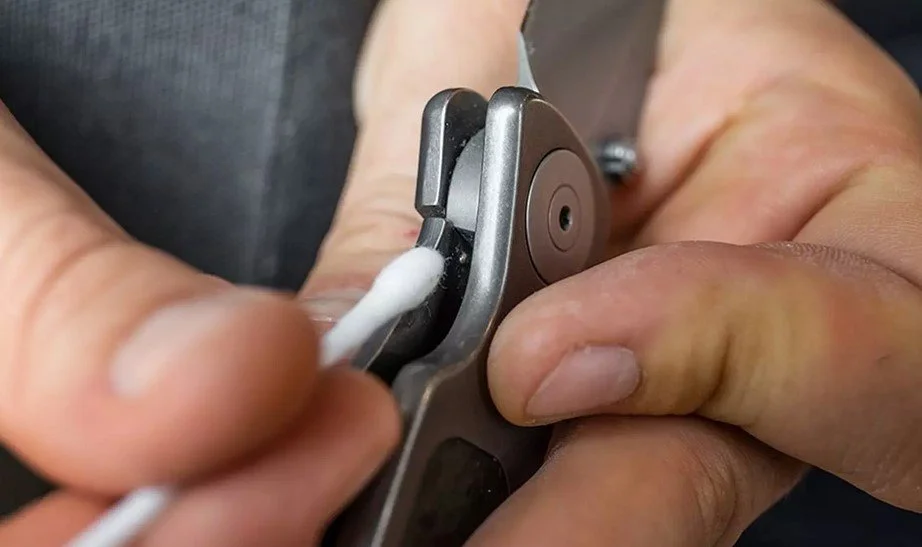Are switchblades a type of “arm” that is covered under the Second Amendment right to bear arms? That’s a question I never even thought to ask until reading a Union-Tribune writeup (paywalled) on a federal suit brought by an Arizona group called Knife Rights.
California law, as criminal defense attorneys in this state know, has quite a few prohibitions against various handheld weapons that are not firearms. Switchblades are among the weapons that are prohibited, along with more obscure items like “slungshots.”
All the Small Things: If a knife has a "detent," shown being cleaned here in an image from the helpful website KnivesandTools.com, that detail can distinguish it from a "switchblade" under California law.
By the way: what’s the diff between a “switchblade” and a mere folding knife? A switchblade, in California, is a pocket knife with at least a 2-inch blade that opens automatically via a “flick of a button, pressure on the handle, flip of the wrist or other mechanical device, or is released by the weight of the blade or by any type of mechanism whatsoever.” At the same time, however, the legal definition excludes a knife that “opens with one hand utilizing thumb pressure applied solely to the blade of the knife or a thumb stud attached to the blade, provided that the knife has a detent or other mechanism that provides resistance that must be overcome in opening the blade, or that biases the blade back toward its closed position.”
Why is one kind of knife okay, and the other not? And what the heck is a “detent”?
Somebody in the Legislature probably knew at some point, no doubt aided by some lobbying from sport knife manufacturers. But the distinction seems rather slim as a mechanical feature that makes the difference between one object being okay to possess and the other being criminal.
Knife Rights argues that California’s prohibition on “switchblade” knives runs afoul of the Second Amendment because switchblade knives fall within the standard for protected “arms” set out by the United States Supreme Court’s decision in N.Y. State Rifle & Pistol Ass’n v. Bruen, 597 U.S. 1 (2022). Bruen says that such arms (as relevant here) must be in “common use” today for self defense and be used in a “course of conduct” that is covered by the plain text of the Second Amendment.
Also clear as mud. That’s law for you.
At any rate, the federal judge hearing this case agreed with the California Attorney General that there is no triable factual issue as to whether switchblades are commonly used for self-defense. To me, the question seems less simple to resolve, because as the court’s order notes, the criteria for deciding whether a weapon is “commonly used” in the sense that matters under Bruen are not entirely obvious and I think most knife users probably are not really closely scrutinizing whether their knife has a “detent” and a bias toward the closed position. As Knife Rights emphasized, switchblades are legal in most states and there are quite a few of them out in use by the public, for better or worse.
For my part, I don’t love switchblades. Or firearms, for that matter. But the question isn’t what I personally like, and it also isn’t what the California Legislature would prefer. The question is what the Constitution permits. That question will have to be taken up on appeal, at least in this case.
